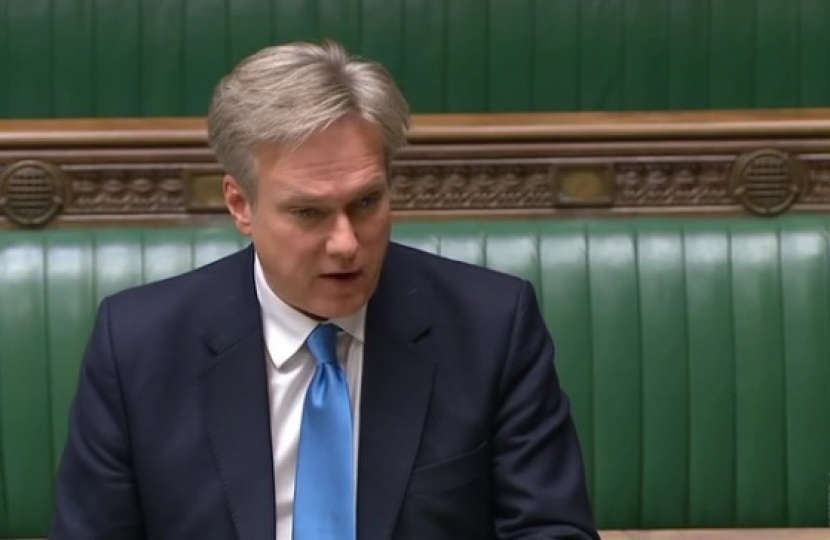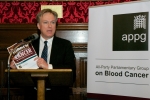
Crawley MP and All-Party Parliamentary Group on Blood Cancer Chair Henry Smith has reiterated his call for improvements in support for issues affecting blood cancer patients and the wider community in Crawley, including access to treatments, mental health provision and GP services.
Henry secured and led the House of Commons Adjournment debate on Friday, 23rd November; unlike all other proceedings in the Commons that day, Henry’s debate was guaranteed to be heard in the chamber, and responded to by the new Minister of State for Health, Stephen Hammond MP.
Speaking in Central Lobby after the conclusion of the debate, Henry said;
“It’s vital that we continue to keep up the pressure on the Government. While blood cancer is the UK’s fifth most common cancer, it’s the third biggest cancer killer in our country.
“The NHS Long-Term Plan will be published imminently, and it’s vital that we see greater support for patients in terms of availability of treatments, and access to psychological support for patients and their families.
“As well as a wider point about the plan needing to ensure support for GPs so NHS patients can be seen at their local surgery, GPs require greater assistance in detecting and flagging cases of blood cancer. On average, a GP will see eight cancer cases per year, with just one of these being blood cancer. Too many blood cancer patients have to visit their GP three or four times before being diagnosed – this needs to change as early diagnosis is key.
“Around 27,000 people with blood cancer in the UK are currently on ‘Watch and Wait’. This is for people with blood cancer for whom their doctor doesn’t believe there’s an added benefit to starting treatment straight away. Even though there are check-ups to keep up-to-date with the condition, it’s also vital that they – and patients during and after treatment – receive the psychological support needed when dealing with cancer diagnosis or treatment.
“The inclusion of blood cancer in data collection initiatives is important, so I cautiously welcome the Minister’s comments about the potential inclusion of blood cancer in future versions of the Cancer Dashboard.”
The Crawley MP has chaired the APPG on Blood Cancer since its formation in June 2016. The Group’s first report, ‘The ‘Hidden’ Cancer: The Need to Improve Blood Cancer Care’, was published in January 2018.
Please click here for the full text of Henry's debate, or see below for extracts.
On access to treatments, Henry said;
“In recent months, there have been some significant decisions regarding treatments for blood cancer on the NHS. In September, CAR—chimeric antigen receptor—T-cell therapy was approved for entry into the Cancer Drugs Fund by the National Institute for Health and Care Excellence and NHS England to treat children and young people with relapsed acute lymphoblastic leukaemia.
“CAR-T therapy is a new type of therapy that modifies a person’s infection-fighting T cells to better spot and kill cancer cells. It could offer people with certain hard-to-treat blood cancers the chance for long-term survival, or even a cure.
“I was pleased to question my right hon. Friend the Prime Minister at Prime Minister’s questions about CAR-T therapy following the NHS England announcement. I continue the call I made that day for the Government to ensure that a focus on blood cancer awareness, diagnosis and prevention will continue into the future.”
On ‘Watch and Wait’, Henry said;
“I am careful to try to refer to patients and their support networks, especially in this context, as the impact of diagnosis on a patient’s family must also be considered, especially when children are involved. This is particularly the case for patients on so-called watch and wait.
“That is typically an option only for people with few or no worrying symptoms, whose quality of life and prognosis will not be affected by delaying treatment, and it is recommended for those with blood cancers or related conditions that are stable or slow-growing. However, if someone has been told that they have cancer and, at the same time, they know that they will literally watch and wait to see when they are in a position to begin treatment, it is understandably disconcerting, to say the least.
“Patients on watch and wait told the APPG inquiry that specific emotional support was required to help them to come to terms with what was happening. Approximately 27,000 people with blood cancer are currently on watch and wait in the UK. To put this in context, that is 13 per cent of those living with blood cancer.”
On mental health, Henry said;
“Turning to mental health, anyone with experience of living with cancer or supporting a friend or family member who has done so will know of the dedication of NHS staff and health workers in seeking to do all that they can to provide support. However, it is vital that these staff are given the tools to ensure that patients are fully equipped mentally through the psychological support that they receive. Our APPG report recommended:
““Patients should have access to the full range of emotional and psychological support services throughout their treatment, for themselves and their families.”
“The Government have put mental health on a par with physical health. As such, I would be grateful for the Minister’s assurances that blood cancer patients will receive the psychological support that they need after diagnosis, during treatment and after it has been completed.”
On GP access, Henry said;
“I urge the Minister to ensure that hospital services continue to come back to sites such as Crawley Hospital, while at the same time ensuring that the resources are in place to enable our constituents to access their GP, not on the other side of the town or county, but in their own local area.”
Please click here for the full text and video of Henry's debate.


